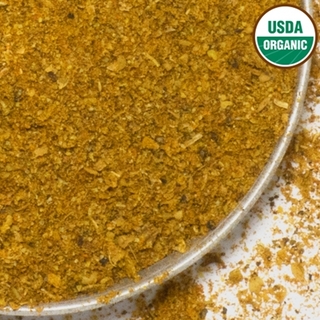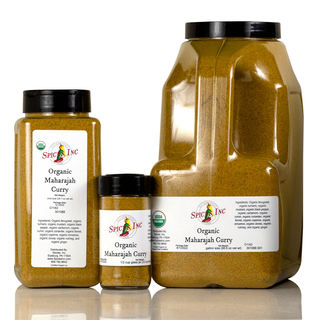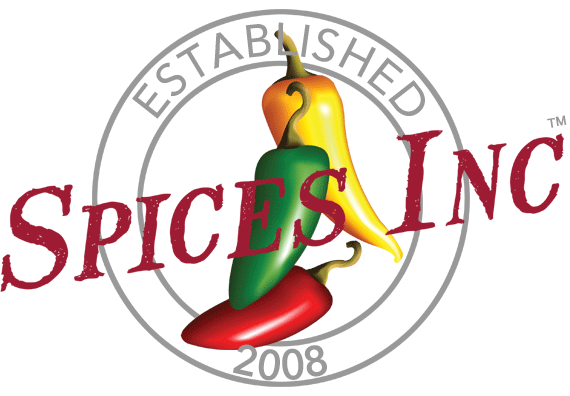Organic Maharajah Curry Powder




Organic Maharajah Curry Powder
One of the most popular curry powders available, Maharajah curry is bursting with flavor and continues to be a customer favorite year-round. The dish curry was thought to have been invented by the British after they spent some time in India, even though the base ingredients of this blend were used together long before the British arrived. This blend is one of the more mild, sweeter curry powders available and just a small amount imparts a huge amount of flavor.
Story (or- What is Curry?)
Curry has a history that is both singular to one place and yet somehow also belongs to the entire world. The word curry has always had a vague meaning which encompasses three different things today. The first is the food, a delicious dish that most people associate with Indian cuisine despite it coming from the British and existing nowhere in India as a food until quite recently. This terminology is used to encompass a huge variety of foods that are prepared worldwide, predominantly including stews that are made with Indian spices. These stews are made with a gravy or sauce with meat and rice, but can also be entirely plant based. The second definition of "curry" is the leaf, found in India and used in cooking. The curry leaf tastes nothing like curry powder, and is absent from curry recipes entirely. The third and final definition of "curry" simply applies to the powder used to make the dish. The origins of the word curry come from the Tamil language. "Kari" is the base word from Tamil, a language spoken in India, that "curry" came from, even though curry is widely believed to have been invented outside of India. Confused yet? If you want a pretty standard, open definition for it for your own personal sanity, just think about a sauce made with a large amount of spices that is used to make a dish with rice and either meat or vegetables and call that curry. Easy enough.
When the British colonized India in the 1800s, they brought their love of Indian food, however less intense it was, back to Britain with them. They called all of these spicy dishes "curry," essentially beginning the global confusion about what the vague definitions of curry can be. In India today, you will find the word curry on menus to denote a dish made with wet ingredients, usually in touristy parts of the country where foreigners are more likely to flock or visit, but this word wasn't in the lexicon when the British were colonizing.
To Americans, curry is a quintessential Indian food, with curry powder being a necessary flavoring ingredient. Indian food is famous for the mass amounts of spices used, yet there is no true "curry powder" used in any of their cooking. Most Indian chefs prefer to build flavors and use spices in their own desired amounts, meaning each dish and recipe is specific to that one cook. Many chefs there use the more common base of a "garam masala" specific to themselves to season their food. For most cooks, this is a collection of the same base ingredients with proportions that vary from place to place. There is no true "garam masala" that can always be used by everyone, though American curry powders and masalas are inspired by the regional differences in cuisines found throughout India. Because curries are really a class of dishes and not a specific dish, curry powders can vary from mild to spicy hot! Serious curry lovers will grind their spices and make their own spice blends or add each spice individually.
Another instance of the global influence of this food is found in Japan, where curry is so deeply embedded in Japanese culture that there are even bands that produce songs about the food. One such song, performed by the group called NEWS, is called "Ai wa Simple na Curry Rice," or "Love is a Simple Curry Rice." This song cutely talks about the relationship between food and healthy, loving relationships, comparing the idea of being in love to a simple curry rice. It warms the heart in the same way that a big bowl of curry would warm the body. Japan got it's love of curry in the late 1800s. After 200 years of being intentionally isolated from the Western world, trade bans were lifted and an influx of Western foods and products flooded the Japanese mainstream. It was the British who brought curry powder with them into the country, and soon the Japanese dish "kare raisu" or "curry rice" was born. In post-WWII Japan, many North Koreans who had been in Japan were forced to return to their home countries, many of them having found a love for curry rice. Family members who were still in Japan would send packets of curry paste to those who had returned to North Korea. These packets of paste were sometimes used as currency in North Korea, making this a very specific and interesting version of a mini spice trade route.
In the Sanskrit language, the word Maharajah means "great ruler" or "great king." The term "Maharani" would be the equivalent female version. The name used for this curry powder lets you know right away how distinct and impactful it is going to be. After all, a great ruler doesn't become great by being blasé or tasteless.
One of the benefits of having an organic version of this incredibly flavorful blend is that we can continue to expand our reach to customers who shop organically. As our inventory of organic spices continues to grow, we will keep developing our organic blend selection to accommodate those of you who are turning to a more earth-friendly way of life and still want incredibly delicious foods at your fingertips.
What's in It?
Our Organic Maharajah Powder is hand blended from organic fenugreek, organic turmeric, organic mustard, organic black pepper, organic cardamom, organic cumin, organic coriander, organic fennel, organic cayenne, organic cinnamon, organic cloves, organic nutmeg, and organic ginger.
Flavor Profile
Organic Maharajah Curry Powder is earthy, somewhat floral, sweet, slightly spicy, and a little citrusy. This is by no means a hot curry powder.
You will get the most out of your Maharajah Curry Powder by frying it in ghee for about 30 seconds or so before use.
Where to Use
This curry powder adds magnificent flavor to seafood and chicken curries, but it is also fantastic on vegetables. Just a bowl of rice with some organic maharajah curry powder sprinkled on top can take that ordinary food into the extraordinary territory. Use this blend to flavor soups, stews, marinades, or sauces. Throw a pinch on your mashed potatoes or change up your morning egg routine with a new flavor. It's great for making roasted nuts, particularly almonds or cashews.
Some dishes we love that have conventional Maharajah Curry Powder that can easily be replaced with this organic version include Quick and Easy Vegetable Curry, Caribbean Vegetarian Curry, and Maharajah Curry Coconut Spiced Cashews.
How Much Should I Buy?
Organic spice blends are a great way for new chefs to start their journey toward learning more about what flavors they like together. This is easier than trying to make your own spice blends right off the bat. Start with a small order and then move up to buying larger quantities. You may even find yourself so excited about the prospect of this spice that you find yourself wanting to buy in bulk! Luckily we can help with that too.
Some of our restaurant customers prefer to purchase our extremely flavorful blends for the sake of convenience. This is a space saver, since they don't have to store a huge amount of spices and can focus on keeping their individual spices separate for other dishes. This curry powder is lovely in a variety of dishes that aren't limited to Indian cuisine, but we do understand there is a connection between curry powders and Indian inspired food! Experiment to find what tastes best to you.
Read More
Indian Spices and Seasonings
What is Curry?
Indian Food- More Than Just Curries
The Curious History of Curry
Nutrition Facts
Serving Size1 tsp
Amount Per Serving
Calories9
% Daily Value*
Total Fat0g1%
Saturated Fat0g0%
Trans Fat0g
Polyunsaturated Fat0g
Monounsaturated Fat0g
Cholesterol0mg0%
Sodium1.6mg0%
Total Carbohydrate1.7g1%
Dietary Fiber0.8g3%
Total Sugars0.1g
Added Sugars0g0%
Sugar Alcohol0.0g
Protein0.5g1%
Vitamin D0mcg0%
Calcium15mg1%
Iron1mg4%
Potassium39mg1%
*The % Daily Value (DV) tells you how much a nutrient in a serving of food contributes to a daily diet. 2,000 calories a day is used for general nutrition advice. These values were calculated and therefore are approximate. For more
